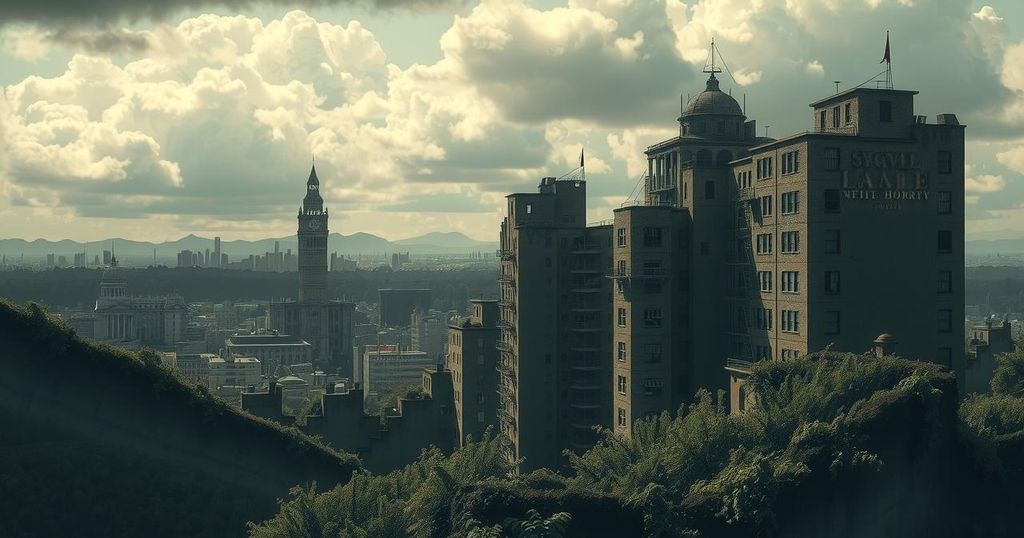The Complex Humanitarian Crisis in Goma Under M23 Rebel Control

Goma, a city in DR Congo, is currently under the control of M23 rebels following a rapid advance that has resulted in significant casualties and a humanitarian crisis. Reports indicate that hospitals are overwhelmed with injured civilians, and the local population expresses both fear and resignation to the rebels’ authority. The situation escalates concerns over regional stability, particularly with allegations of foreign involvement in the conflict.
Upon entering Goma, DR Congo, the atmosphere initially appeared normal, with residents commuting and vendors engaged in commerce. However, the reality of conflict soon became apparent as M23 rebel fighters, armed and in control, established checkpoints throughout the city. After recently seizing Goma, M23’s actions have resulted in significant casualties, with the UN reporting at least 700 deaths and close to 3,000 injuries due to clashes with government forces.
The M23 group, identifying as defenders of minority rights and composed primarily of ethnic Tutsis, faces allegations from the Congolese government of collusion with Rwanda to exploit the region’s rich mineral resources. Despite the oppression from armed rebels, I witnessed a hospital inundated with victims of violence. Dr. Nathaniel Cirho, a wounded physician, recounted a tragic incident involving a bomb blast that claimed his neighbor’s life.
The grim accounts continued as another patient described her experience of extracting a bullet from her arm. Overwhelmed hospitals now treat hundreds of patients suffering from gunshot wounds and blast injuries. Human Rights officials have cautioned that sexual violence is being systematically employed as a weapon of war, echoing testimonies from medical staff.
As the situation stabilizes, some businesses have cautiously resumed operations while many remain paralyzed by fear. While some residents express resignation to M23’s governance, unease persists about the future. Shop owner Sammy Matabishi stated, “People are afraid… I am still afraid because those who caused the tension are still with us.”
Moreover, M23 has consolidated their power by occupying key military and governmental facilities, and reports indicate that the Congolese military has largely retreated. Critics of the situation urge international awareness, noting Rwanda’s alleged support for the rebels while the Congolese government refutes claims of territorial loss. The rebels are advancing towards Bukavu, posing a fear of escalating conflict throughout the region.
The complex tapestry of human suffering intertwined with political strife in Goma exemplifies a dire humanitarian crisis that may extend into broader areas of the Democratic Republic of the Congo. The implications of M23’s control contribute to a culture of instability affecting civilians and regional dynamics.
The Democratic Republic of the Congo (DRC) has been plagued by decades of conflict, stemming from political instability and competition for resources, particularly in the eastern regions where Goma is located. M23, a rebel group largely composed of ethnic Tutsis, has emerged as a significant force in the ongoing turmoil, clashing with government troops and creating an environment of widespread violence and fear. This escalation has drawn international attention, raising concerns over human rights violations and regional security, particularly in light of alleged foreign support for the rebels. The UN and other humanitarian organizations have continuously reported on the dire conditions faced by civilians, with hospitals overwhelmed by casualties from recent conflicts. As various factions vie for power, the people of Goma find themselves caught in the crossfire, with safety becoming a fleeting hope amid the chaos.
The situation in Goma serves as a stark reminder of the dire consequences of armed conflict on civilian populations. The M23 rebels’ control has led to significant loss of life, with hospitals struggling to manage an influx of injured individuals. As residents grapple with fear and uncertainty, the implications of ongoing violence extend beyond Goma, threatening regional stability and underscoring the need for international intervention and support. The cyclical nature of conflict in the DRC must be addressed to foster peace and security for its people.
Original Source: www.bbc.com








